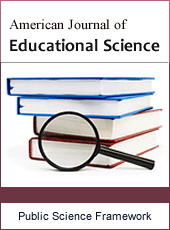American Journal of Educational Science
Articles Information
American Journal of Educational Science, Vol.4, No.4, Dec. 2018, Pub. Date: Aug. 31, 2018
Research on the Cultivation of Education Master Candidates Based on Improvement of Mathematical Abstract Literacy Cultivation Ability
Pages: 81-85 Views: 2116 Downloads: 478
[01]
Zezhong Yang, The School of Mathematics and Statistics, Shandong Normal University, Jinan, China.
[02]
Liping An, The School of Mathematics and Statistics, Shandong Normal University, Jinan, China.
[03]
Can Wang, The School of Mathematics and Statistics, Shandong Normal University, Jinan, China.
Mathematical abstract literacy is one of the six components of the core quality of high school mathematics, which runs through the whole process of student learning. The middle school teachers should have mathematical abstract literacy and mathematical abstract literacy cultivation ability. Education master candidates are the future math teacher. Therefore, for the cultivation of education master candidates, colleges and universities should strengthen the teaching of mathematical abstract knowledge, improve the teaching practice ability, improve the ability to find and solve problems and cultivate the mathematics culture so that they have the ability to cultivate the abstract quality of mathematics.
Mathematical Abstract Literacy, Cultivation Ability, Education Master Candidates
[01]
Zhou X. Z. (2017). The Practice of Training Mathematics Abstract Ability in High School Mathematics Core Qualities. Research on Mathematical Problem Solving, 21 (19), 39-41.
[02]
Cihai Editorial Committee. (2009). Cihai. Shanghai: Shanghai Lexicographical Press.
[03]
Sun H. A. (2017). On Mathematical Abstraction. Mathematics Teaching Reference for Secondary Schools (First Half), 46 (03), 2-5.
[04]
Wang H. M. (2016). Practice and Understanding of Core Accomplishment Mathematical Abstraction. Secondary School Mathematics, 38 (09), 47-50.
[05]
Quan Y. (2017). Senior High School Students' Mathematical Abstract Competence Survey Survey. (Master's thesis, Yangzhou University).
[06]
Guo M. H. (2012). Cultivating the Ability of Abstract Generalization and Improving the Comprehensive Application of Knowledge. Science and Technology Innovation Herald, 12 (170), 172.
[07]
Xu H. Y. (2015). On the Cultivation of Mathematics Abstract Ability and Mathematics Generalization Ability of Middle School Students. Mathematics Teaching Newsletter (Elementary Education), 37 (05), 24-25.
[08]
Mao L. C. (2018). Concerned with the Concept of Growth and Development to Allow Mathematics to fall on the Ground, Taking the Roots of the Concept of “Functional Concepts” as an Example. Middle School Teaching and Research (Mathematics), 41 (01), 19-22.
[09]
Chen Z. F. (2017). On the Formation and Development of Mathematical Abstraction Literacy. Fujian Middle School Mathematics, 38 (06), 1-4.
[10]
Cai J. S. (1994). The Development of Mathematical Abstraction Ability. Journal of Shaoxing Normal University (Natural Science Edition), 14 (05), 34-38.
[11]
Chen H. T. (2016). Study on the Problem of Cultivating Students' Abstract Thinking Ability in High School Mathematics Class. Science Examination Research, 27 (15), 38.
[12]
Zhang S. T. (2017). Introduce Various Situations and Develop Mathematical Abstraction -- -- the Teaching Design of Series Concept Based on the Core Accomplishment of Mathematics. Secondary School Mathematics, 39 (19), 41-43.
[13]
Guo C. L. (2018). Ways to Cultivate Abstract Thinking Ability of Junior Middle School Students. Education Science Forum, 32 (06), 50-51.
[14]
Gong J. H. (2017). To Cultivate the Abstract Quality of Mathematics in Elliptical Teaching. Mathematics Communication, 85 (04), 7-11.
[15]
Kang W. Y. and Liu H. (2017). Several Ways to Cultivate Students' Abstract Core Quality. Education Exploration, 37 (05), 38-41.
[16]
Zhao J. (2015). An Abstract Expression of Mathematics and Its Teaching and Learning Investigation and Research (Master's thesis, Nanjing Normal University).
[17]
Yu P. (2016). An Empirical Study on the Analysis of Core Literacy Elements in Mathematics. Mathematics Education Report, 25 (06), 1-6.

ISSN Print: 2381-7127
ISSN Online: 2381-7135
Current Issue:
Vol. 6, Issue 2, June Submit a Manuscript Join Editorial Board Join Reviewer Team
ISSN Online: 2381-7135
Current Issue:
Vol. 6, Issue 2, June Submit a Manuscript Join Editorial Board Join Reviewer Team
| About This Journal |
| All Issues |
| Open Access |
| Indexing |
| Payment Information |
| Author Guidelines |
| Review Process |
| Publication Ethics |
| Editorial Board |
| Peer Reviewers |


